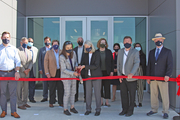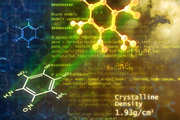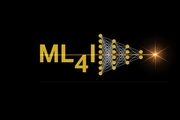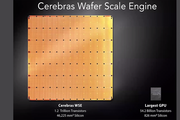Did you know we have a monthly newsletter? View past volumes and subscribe.
Understanding materials behavior with data science (VIDEO)
Dec. 21, 2021 -
Computational chemist Rebecca Lindsey, PhD, explains how machine learning and data science techniques are used to develop diagnostic tools for stockpile stewardship, such as models that predict detonator performance. Lindsey also describes how atomistic simulations improve researchers’ understanding of the microscopic phenomena that govern the chemistry in materials under extreme conditions...
Building better materials with data science (VIDEO)
Nov. 11, 2021 -
Research engineer Brian Giera, PhD, describes how data science techniques help collect and analyze data from advanced manufacturing processes in order to craft meaningful experiments. With examples of automated microencapsulation, 3D nanoprinting, metal additive manufacturing, laser track welding, and digital twins, Giera explains how interdisciplinary teams apply machine learning to remove...
Building confidence in materials modeling using statistics
Oct. 31, 2021 -
LLNL statisticians, computational modelers, and materials scientists have been developing a statistical framework for researchers to better assess the relationship between model uncertainties and experimental data. The Livermore-developed statistical framework is intended to assess sources of uncertainty in strength model input, recommend new experiments to reduce those sources of uncertainty...
LLNL joins Human Vaccines Project to accelerate vaccine development and understanding of immune response
Oct. 21, 2021 -
LLNL has joined the international Human Vaccines Project (HVP), bringing Lab expertise and computing resources to the consortium to aid development of a universal coronavirus vaccine and improve understanding of immune response. The HVP is a nonprofit, public-private partnership with a mission to decode the human immune system and accelerate the development of vaccines and immunotherapies...
Tackling the COVID-19 pandemic
Oct. 11, 2021 -
To help the U.S. fight the COVID-19 pandemic, LLNL did what it does best: quickly bring together interdisciplinary teams and diverse technologies to address urgent national challenges. This effort includes applying advanced high-performance computing resources to biological research and anayzing complicated computer models and enormous datasets. Read more in Science & Technology Review.
Inaugural industry forum inspires ML community
Sept. 16, 2021 -
LLNL held its first-ever Machine Learning for Industry Forum (ML4I) on August 10–12. Co-hosted by the Lab’s High-Performance Computing Innovation Center (HPCIC) and Data Science Institute (DSI), the virtual event brought together more than 500 enrollees from the Department of Energy (DOE) complex, commercial companies, professional societies, and academia. Industry sponsors included...
LLNL, NNSA and elected officials celebrate opening of Livermore Valley Open Campus expansion
Aug. 26, 2021 -
Leaders from the NNSA, Congressional representatives and local elected officials gathered at LLNL on August 10 to celebrate an expansion to the Livermore Valley Open Campus (LVOC). The Lab hosted a ribbon-cutting ceremony for a new office building (Bldg. 642) and a conference annex (Bldg. 643), which will provide modern office and meeting space for LLNL researchers in predictive biology...
Career panel series kicks off with women in Computing leadership roles
July 6, 2021 -
More than 100 LLNL staff and students gathered virtually for the first session of a new career panel series inspired by the annual WiDS conference and sponsored by the DSI. Panelists discussed how they have shaped their careers at the Lab and in Computing, their journeys into leadership roles, and how they navigate career challenges. Data scientist and panel series organizer Cindy Gonzales...
Machine learning aids in materials design
June 10, 2021 -
A long-held goal by chemists across many industries is to imagine the chemical structure of a new molecule and be able to predict how it will function for a desired application. In practice, this vision is difficult, often requiring extensive laboratory work to synthesize, isolate, purify, and characterize newly designed molecules to obtain the desired information. Recently, a team of LLNL...
COVID-19 detection and analysis with Nisha Mulakken (VIDEO)
June 7, 2021 -
LLNL biostatistician Nisha Mulakken has enhanced the Lawrence Livermore Microbial Detection Array (LLMDA) system with detection capability for all variants of SARS-CoV-2. The technology detects a broad range of organisms—viruses, bacteria, archaea, protozoa, and fungi—and has demonstrated novel species identification for human health, animal health, biodefense, and environmental sampling...
Laser-driven ion acceleration with deep learning
May 25, 2021 -
While advances in machine learning over the past decade have made significant impacts in applications such as image classification, natural language processing and pattern recognition, scientific endeavors have only just begun to leverage this technology. This is most notable in processing large quantities of data from experiments. Research conducted at LLNL is the first to apply neural...
The data-driven future of extreme physics
May 19, 2021 -
By applying modern machine learning and data science methods to “extreme” plasma physics, researchers can gain insight into our universe and find clues about creating a limitless amount of energy. In a recent perspective published in Nature, LLNL scientists and international collaborators outline key challenges and future directions in using machine learning and other data-driven techniques...
Lab offers forum on machine learning for industry
April 22, 2021 -
LLNL is looking for participants and attendees from industry, research institutions and academia for the first-ever Machine Learning for Industry Forum (ML4I), a three-day virtual event starting Aug. 10. The event is sponsored by LLNL’s High Performance Computing Innovation Center and the Data Science Institute. The deadline for submitting presentations or industry use cases is June 30. The...
COVID-19 HPC Consortium reflects on past year
April 1, 2021 -
COVID-19 HPC Consortium scientists and stakeholders met virtually on March 23 to mark the consortium’s one-year anniversary, discussing the progress of research projects and the need to pursue a broader organization to mobilize supercomputing access for future crises. The White House announced the launch of the public-private consortium, which provides COVID-19 researchers with free access to...
Lab event encourages growth of women in data science
March 17, 2021 -
Coinciding with International Women’s Day on March 8, LLNL’s 4th Women in Data Science (WiDS) regional event brought women together to discuss successes, opportunities and challenges of being female in a mostly male field. The Lab’s first-ever virtual WiDS gathering attracted dozens of LLNL data scientists as well as some from outside the Lab, and featured speakers, a career panel and...
Model for COVID-19 drug discovery a Gordon Bell finalist
Nov. 17, 2020 -
A machine learning model developed by a team of LLNL scientists to aid in COVID-19 drug discovery efforts is a finalist for the Gordon Bell Special Prize for High Performance Computing-Based COVID-19 Research. Using Sierra, the world’s third fastest supercomputer, LLNL scientists produced a more accurate and efficient generative model to enable COVID-19 researchers to produce novel compounds...
DOE announces five new energy projects at LLNL
Nov. 13, 2020 -
The DOE today announced two rounds of awards for the High Performance Computing for Energy Innovation Program HPC4EI), including five projects at LLNL. HPC4EI connects industry with the computational resources and expertise of the DOE national laboratories to solve challenges in manufacturing, accelerate discovery and adoption of new materials and improve energy efficiency. The awards were...
What put LLNL at the center of U.S. supercomputing in 2020?
Nov. 12, 2020 -
The HPC world is waiting for the next series of transitions to far larger machines with exascale capabilities. By this time next year, the bi-annual ranking of the Top500 most powerful systems will be refreshed at the top as Frontier, El Capitan, Aurora, and other DOE systems come online. While LLNL was already planning around AI acceleration for its cognitive simulation aims and had a number...
AI gets a boost via LLNL, SambaNova collaboration
Oct. 20, 2020 -
LLNL has installed a state-of-the-art artificial intelligence (AI) accelerator from SambaNova Systems, the National Nuclear Security Administration (NNSA) announced today, allowing researchers to more effectively combine AI and machine learning (ML) with complex scientific workloads. LLNL has begun integrating the new AI hardware, SambaNova Systems DataScale™, into the NNSA’s Corona...
LLNL, ANL and GSK provide early glimpse into Cerebras AI system performance
Oct. 13, 2020 -
AI chip and systems startup Cerebras was one of many AI companies showcased at the AI Hardware Summit which concluded last week. Cerebras invited collaborators from LLNL, Argonne National Laboratory, and GlaxoSmithKline to talk about their early work on Cerebras machines and future plans. Livermore Computing's CTO Bronis de Supinski said, “We have this vision for performing cognitive...























